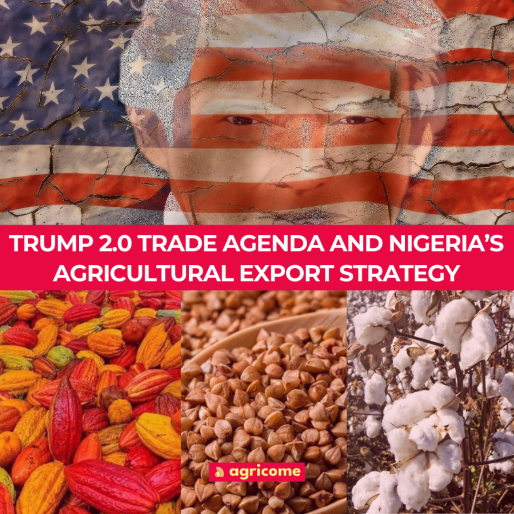The ‘America First’ ideology underpins President Trump’s justification for imposing tariffs. While this shift is designed to strengthen American production, it could restrict market access for partners like Nigeria, especially in the agricultural space. During his previous term, Trump advanced protectionist measures—raising tariffs, renegotiating trade deals, and tightening customs procedures. Now, similar moves have resurfaced.
Recently, President Donald Trump imposed a 14% reciprocal tariff on Nigerian exports to the United States, citing perceived “imbalanced trade practices”. Later on, a baseline 10% tariff was applied to imports from 185 countries, including Nigeria. For Nigeria, this development transcends mere tariff percentages, it represents a critical juncture in the country’s economic identity and its trade relationship with one of its key global partners.
Nigeria’s trade relationship with the United States spans several decades. Two critical frameworks that have shaped this bilateral relationship are the African Growth and Opportunity Act (AGOA) and the Trade and Investment Framework Agreement (TIFA).
WHY THIS MATTERS FOR NIGERIA’S AGRIC EXPORT SECTOR
• Cocoa trade exposure: As the world’s fourth-largest cocoa producer, Nigeria is heavily reliant on markets like the US for its cocoa exports. Any tightening of trade terms, such as increased tariffs or reduced market access, could significantly reduce demand for Nigerian cocoa, depress prices, and negatively impact foreign exchange earnings. This is particularly concerning since over 90% of Nigeria’s exports to the U.S. are oil-related, which means the non-oil sector, including agriculture, faces increased pressure to diversify export revenue streams and mitigate vulnerability to global oil price fluctuations.
• Pressure on sesame and cashew exports: Sesame seeds and cashew nuts are among Nigeria’s most competitive agricultural commodities on the global stage. However, the absence of preferential trade terms, such as those provided by AGOA, could make Nigeria’s agricultural exports less attractive. In particular, countries like India and Vietnam, which already benefit from streamlined U.S. trade channels and better processing infrastructure, may increase their share of the market. This shift in demand could undermine Nigeria’s competitive advantage in these sectors.
• AGOA’s uncertain future: AGOA has granted Nigeria duty-free access to over 6,000 products in the U.S., playing a crucial role in supporting non-oil exports, particularly agricultural commodities. However, with AGOA set to expire in 2025, and recent signals from the U.S., Nigeria faces significant uncertainty. The possibility that import bans or trade disputes could justify a reduction in AGOA benefits adds further risk to Nigerian SMEs and agro-processors who rely on the preferential access to penetrate the U.S. market.
WHAT NIGERIA MUST DO NOW:
• Diversify export destinations: Nigeria must deepen trade relations with alternative markets, such as the European Union, China, and other African nations under the African Continental Free Trade Area (AfCFTA). This strategic diversification will help insulate Nigeria’s agricultural export sector from unpredictable shifts in U.S. trade policies, as well as enhance access to emerging and high-growth markets.
• Invest in local processing: By shifting from raw commodity exports to processed goods, Nigeria can increase the value of its agricultural products, thus minimizing exposure to tariffs on unprocessed goods. This would stimulate domestic industries and retain more revenue within the country.
• Enhance product standards and certifications: To command premium pricing and access high-value markets, Nigeria must raise its product quality standards and secure relevant certifications. This will improve competitiveness and enable Nigerian exporters to gain entry into lucrative international markets.
• Strengthen trade Diplomacy: Proactive engagement with the United States is critical—the Nigerian government should advocate for clearer AGOA terms and negotiate for a new framework if necessary. This is especially crucial as Nigeria navigates the delicate balance between protecting domestic industries and maintaining access to one of the world’s largest consumer markets.
Trump’s tariffs are strategically designed to advance the interests of Americans—America First. In the same vein, Africa must now prioritize its interests by embracing an “Africa-First” approach. As the continent’s economic powerhouse, Nigeria must lead this charge, for these tariffs are warning shots!
What other strategies can help Nigeria compete in a shifting global trade order? Let us hear your thoughts in the comment section.
